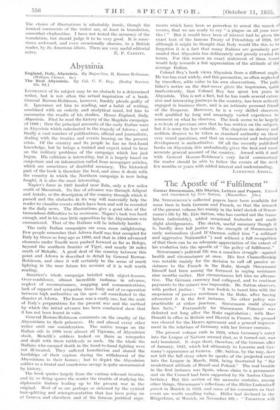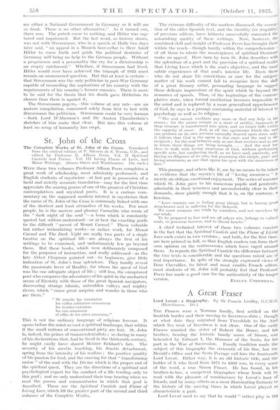The Apostle of " Fulfilment "
Gustav Stresemann, His Diaries, Letters and Papers. Edited and. translated by Eric. Sutton. (Macmillan. 25s.) .
Da. STRESEIVIANN'S collected papers have been available for some time in both German and French, so that the interest of the present volume lies mainly in the brief sketch of Strese- mann's life by Mr. Eric Sutton, who has carried out the trans- lation (admirably), added occasional footnotes and made slight abridgements. The sketch, useful summary though it is, hardly does full justice to the strength of Stresernanns early nationalism (Lord D'Abernon called him " a militant and aggressive Nationalist ") and without a full recognition of that there can be no adequate appreciation of the extent of his evolution into the apostle of " the policy of fulfilment."
Stresemann's political life was a ceaseless struggle—against health and circumstance at once. His first Chancellorship was notable mainly for the decision to call off passive re- sistance to the French in the Ruhr, though Stresemanii himself had been among the foremost in urging resistance nine months earlier. But circumstances left him no alterna- tive. The German currency had collapsed, and to continue payments to the miners was impossible. Mr. Sutton observes, with perfect justice : " it was foolish to taunt him with the suspension of passive resistance in the Ruhr, after having advocated it in the first instance. No other policy was practicable at either juncture. Stresemann could always face facts." Fortunately for Stresemann Peincare was defeated not long after the Ruhr capitulation ; with Mac Donald in office in Britain and Herriot in France, the ground was cleared for the Dawes agreement and a general improve- ment in the 'relations of Germany with her former enemies.
The. present volume ends in 1924, when Germany's entry into the League of Nations seemed (but, as it turned out, Iwo" not) imminent. It stops short, therefore, of the German offer of January, 1925, which led ultimately to Locarno and Ger- many's appearance at Geneva. (Mr. Sutton, by the way, does not tell the full story when he speaks of the projected entry into the League in March, 1926, being frustrated by " the recalcitrant attitude of Brazil and Poland." The real trouble in the first instance was Spain, whose claim to a permanent seat on the Council had been supported by Sir Austen Cham- berlain.) But this section of the memoirs contains, among other things,-Stresemann's reflections of the Hitler-Ludendorff putsch in Munich in 1923, and some of his comments on that event are worth recalling today. Hitler had declared in the Biirgerbrau, at Munich, on November 8th_: " Tomorrow will see either a National Government in Germany or it will see us dead. There is no other alternative." AS it turned, out, there was. The putsch came to nothing, and Hitler was cap- tured and imprisoned. But the last word, as history shows, was not with Stresemann, who in a speech at Halle two days later said, " an appeal in a Munich beer-cellar to Herr Adolf Hitler to come -forth and guide the political destinies of Germany will bring no help to the German people. Without. a programme and a personality the cry for a dictatorship is an empty catchword." Whether, if Stresemann had lived, Hitler would ever have achieved the triumph of 1933 must remain an unanswered question. But this at least is certain— that Stresemann was the only politician in post-War Germany capable of reconciling the aspirations of his country With the requirements of his country's former enemies. There is more to be said for the thesis that his death gave ilitlerism its chance than there is against it.
The Stresemann papers,—this volume at any rate—are an austere compilation, concerned solely from first to last with Stresemann the politician. Stresemann could be very human —both Lord D'Abernon's and Sir Austen Chamberlain's sketches of him make that clear. But into this volume at least no scrap of humanity has crept. H. W. H.































































 Previous page
Previous page